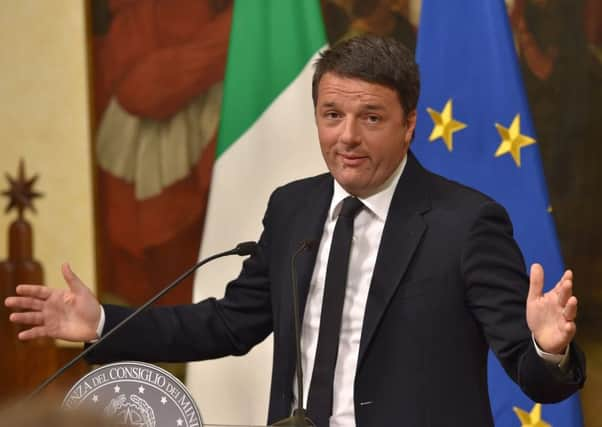Leader comment: Populist vote in Italy set to impact the Euro


First came Brexit, then came the election of Trump, and now in what will be seen as the continuation of a wave of populist voting the Italians have caused the resignation of what was arguably a very succesful prime minister.
It was not a partuclarly anti-EU stance, despite what Marine le Pen would like to portray, in fact both the top populist parties in Italy, Five Star and the Northern League, are not opposed to membership of the EU itself but they are opposed to the eurozone.
Advertisement
Hide AdAdvertisement
Hide AdBut it will hardly be seen as a ringing endorsement of the actions of the EU, and the issues driving this referendum result; fears over the waves of refugees from Africa, a desire to rise up against the establishment and unhappiness with the economy are the same we have seen elsewhere.
But it is the economic impact that we have most to fear from the Italian result, and also what that might mean for the negotiations over Britain’s exit from the EU. The Italian economy is far from healthy, despite marginal improvements in unemployment rates. The banks remain weak and the country’s debt-to-GDP ratio, at 133 per cent, is second only to Greece’s in the eurozone. The economy is 12 per cent smaller than when the financial crisis began in 2008. But Italy is still the eurozone’s third largest economy.
Now President Sergio Mattarella will be anxious to ease fears of instability, but in reality he will be helpless to do so. Regardless of what action he takes there will now be a delay as the markets understand what is going to happen, the only variable is how long that period of instability will last. And the markets do not like instablity.
There is a risk that the failure of a major Italian bank – such as the troubled Banca Monte dei Paschi di Siena – could set off a wider crisis, and making the banks strong enough becomes more difficult amid this political uncertainty.
That could well provoke another crisis in the euro, right about the time that Britain is in negotiations about its withdrawal. That coming together of events is not going help any euro crisis or help Theresa May and her government getting a favourable Brexit deal.
The most telling comment yesterday came from German finance minister Wolfgang Schaeuble, who said there was no reason for a euro crisis but that Italy urgently needed a functioning government. That was him telling Italy that unless it gets in act together the euro will suffer, but that any currency crisis was not inevitable. Unfortunately it is unlikley that the Italians will be able to end the uncertaintly soon enough.